The Freedom Artist Read online
Page 2
The old man allowed a longer silence to infiltrate his words.
‘I have travelled all the routes on the map. I have exhausted the old road. My way has failed, and we are still here, in prison. Now it’s your turn. It’s your time. Find the elixir of freedom, and bring it back to the people, that we may all be free. If not, we will perish. We will perish of hopelessness.’
The old man stopped. He opened his eyes, and was about to resume, when he found that the boy had fallen asleep.
2
In another house, early in the evening, Amalantis was listening to her lover with a listless air.
His name was Karnak. He was a fine young man with gentle features and doe-like eyes. He was at an in-between stage in his life, awaiting employment. He was speaking of the charm of her cheeks, the bewitchment of her eyes, and the firm grace of her body. He was passionately in love with her. But for some time now she had been feeling a strange emptiness. The more people praised her beauty, the emptier she felt.
It had begun one morning long ago when she was staring into a mirror. As she gazed at her face someone in the mirror appeared to wink at her. She became aware that there was someone inside her who wasn’t her. The more she looked the more she felt that someone other than her was trapped behind her face. Who is behind that mask that everyone thinks is me, she wondered. This question was the beginning of her troubles.
She got it into her head that whoever was behind her face was a prisoner. She felt imprisoned within herself. It was a notion that brought panic. She could not share this notion with anyone.
Everybody thought Amalantis beautiful. But the more people praised her beauty, the more she felt like a fraud. This made her silent in the face of adulation, deepening her mystery, increasing the adulation. Often lost in thought, she felt estranged from the truth of life, and began to brood. That was long ago.
When Karnak poured praises on her, she could think of nothing to say except what she should not say.
‘Your praise makes me ill.’
‘I’m sorry to hear that.’
‘Why don’t we talk about something more intriguing?’
‘Like what?’
‘Like… who do you think the prisoner is?’
Karnak was startled, as if stung by a snake.
‘Prisoner? What prisoner?’
‘You know, the graffiti they keep trying to get rid of? The stuff that keeps appearing everywhere?’
‘What’re you talking about?’
‘Who is the prisoner?’
Karnak shut the door quickly.
‘We’re not supposed to say that word. It could get us into trouble. We could be put away for it.’
‘Are you afraid of the truth too?’
‘Truth? What truth?’
‘You know everyone’s asking the question.’
‘But they’re not asking it out loud. Don’t say that word again. Don’t say anything.’
Amalantis didn’t speak for a while but stared thoughtfully out of the window.
‘I would like to know,’ she said eventually, ‘who the prisoner is.’
‘Why?’
At that moment, they heard three knocks at the door. The young lover opened the door and saw three men standing there. They were dressed identically in grey suits and ties. They went over to the girl and marched her out to the road, where a grey van was already waiting.
Amalantis was silent as she was led away. Karnak found himself in the doorway, watching as if in a dream. She was hoisted into the back of the van. Then it pulled away. Not one of the men had spoken a single word.
3
There were many such arrests throughout the land. They took place at all hours of the day or night. People were arrested while they slept, in the middle of their dreams, or while they were at work. Nobody protested. Those who came to do the arresting did not speak. Their presence was enough. Those arrested were taken to unknown places, never heard from again.
A strange silence spread across the land. The streets gradually emptied. Those who were not arrested, but witnessed the arrests of others, went around in a constant state of fear. People spoke less and less to each other. Their conversation became neutral. They stopped looking one another in the eye. No laughter was heard in the streets. A gloomy mood pervaded the land.
Naturally, the quality of language changed. Certain words became suspicious and vanished from public life. Words like ‘hope’, ‘rights’, ‘truth’. Anyone heard uttering those words found empty spaces around them. It wasn’t long before anyone using the word ‘freedom’ was suspected of harbouring dangerous intentions.
The question which appeared on walls did not go away just because the authorities grew more ruthless. If anything the question and its appearance in public spaces grew more audacious.
On a bright morning the wind would blow square bits of paper among the populace. On these miniature bills was the question: WHO IS THE PRISONER?
Silence had only multiplied the power of the question.
4
There were, in those times, two classes of people. One, the overwhelming majority, were the ‘normal’ people. They did not speak much. They did their work, fulfilled their obligations, raised their families, read the newspapers, absorbed all they read, watched television, and believed all they saw. They kept their nightmares to themselves. They constituted the highest presence in hospital wards and psychiatric clinics. They had, as a running music in their heads, a steady, unchanging drone.
And yet, at night, in room after room, across council estates or in rich suburbs, screams could be heard coming from their beds. They shouted in their sleep and howled like frightened animals. This could be heard at night all across the land. It became so common that soon it was considered the normal mode of sleep. That is to say no one noticed it any more.
5
The second kind of people looked like the first except for one thing. They were more alert. They didn’t sleep much at night. Their eyes had a constant wakefulness. They didn’t read the newspapers, treated television as a daily farce, and believed nothing of what they saw or heard. They were the few.
They drank water, stared at the sky, listened to the wind, and paid attention to everything. They were generally silent. If addressed or asked a question they shrugged. They spoke gently. They smiled mysteriously, incompletely, an inward smile made almost visible.
They worked as little as possible and yet were immensely productive. They seemed solitary, but were not lonely. They could often be heard humming a piece of music to themselves. They ventured no philosophy, and offered no resistance. They seemed absent when present. But they were present when absent.
They did not scream in their sleep and never had nightmares. They were unnoticeable, indistinguishable. But a strange light hovered in the space they had vacated. They were deep breathers and had a curious quality of agelessness about their features.
They did not hear an unchanging background drone in their heads. They heard a pure silence, the mildest fragrance of a melody.
☆
More than anything else it was her beauty that frightened him.
‘How can you be so beautiful and still be human?’ he asked.
‘Am I beautiful?’
‘You know you are.’
‘Let me show you what beauty is,’ she said.
Then she got him to take a long walk with her. It was early in the evening. She took him to the far fields on the edge of the city. Gentle howls were drifting across from the trees.
‘Wait here,’ she said.
They stood for ten minutes and nothing happened. Then just as he was beginning to feel restless he saw these horses in the field. He didn’t know where they came from. They just seemed to appear. They were huge and their bodies slick and fine. There were black horses and white ones and horses that were almost golden in colour. They grazed and played and galloped, their manes blowing in the light wind.
‘That’s beautiful,’ she said, after they stared at
the horses a long time in silence.
On the way back they passed an old woman in a doorway. She sat in the doorway, looking unhappy and a little lost.
‘That’s beautiful too,’ Amalantis said.
‘That old woman who looked sad?’
‘Yes,’ she said. ‘That’s one of the most beautiful people I know.’
Karnak looked back at the old lady, who was weeping now. Amalantis said:
‘You go on home. I have to help her.’
‘But you don’t even know her.’
‘I do now,’ she said, and went back to the old lady.
Karnak watched her talking to the old lady for a long time. He waited in the shadow of the building. Then after a while the old lady and Amalantis went into the house. Karnak sat and leant against the wall and waited. He fell asleep. When he woke up he found Amalantis sitting next to him, watching him with a tender expression in her eyes.
‘Why didn’t you wake me?’
‘Thank you for waiting for me,’ she said.
‘Why didn’t you wake me, though?’
‘Because I kept thinking how beautiful you looked. I wanted to show you what beauty was and didn’t quite know how.’
‘What happened with the old woman?’
‘She just wants to die.’
‘But why?’ Karnak asked, looking at her.
Amalantis didn’t reply. She merely looked at him as if he should know the answer already.
He didn’t then, and it bewildered him.
6
The old man was found dead on the night of the full moon, sitting upright in his chair, with an open book in his lap. His face was at peace. Those who looked closely saw a faint smile on his lips.
He had bequeathed his earthly possessions to his family, urging them to keep alive the old myths now being forgotten. To the boy, with whom he spent the last months reading, he bequeathed a particular manuscript. It was to be read only by him, when he was ready.
The manuscript was written in the old hand, which few people could read. It was called The Legend of the Prison.
7
The boy did not weep at the old man’s funeral. Nor did anyone else. He was one of the secret heroes of the land. His death was an occasion for celebration, silence, and poetry. The old bards appeared among them. As the body was being transmuted into the golden ash of his final estate, they recited the ancient myths in deep intonations. With music wrung from the lyre and the drum, their voices accompanied the flight of the old man’s soul to Elysium.
At the appointed time, the old bards came for Mirababa and led him into the forest. This was in accordance with the ancient custom which dictated that with the death of an old myth-maker a new one is initiated. The old man’s death was the beginning of the boy’s life.
That night many in the land noticed the flight of a white eagle. It seemed to fly straight into the unnatural whiteness of the full moon.
8
Karnak had watched helplessly from the door while that flower of the land was taken away. Like a sacrificial lamb, she had gone without a sound of protest. At the door of the van she had turned her head to look back at him. A mysterious smile trembled on her lips. With an inexplicable movement of her head, a lifting of her face, she got into the back of the van and was driven away.
The young lover was rooted to the spot, as if under a spell. He stared at the empty space where he had last seen the strange smile on her face. He stared and saw nothing. He thought nothing.
A numbness spread through him. He simply stared. He did not notice the birds whirling in the air. He did not notice passers-by staring at him. Neighbours went past him, said ‘hello’, and he did not hear them. They noticed his vacancy.
He stood there for a long time. He didn’t see the light change in the sky. He didn’t see the darkness extending its dominion over the earth. He didn’t hear the sounds of the world altered by the vanishing light.
Then a shout in the street woke him from his stupor. When he looked around he saw, to his amazement, that it was already dark. Feeling stiff from standing too long in one place, he shut the door behind him and set off on the long solitary walk to his home through the darkening streets.
As he walked he heard shouts and howls rising from the houses he passed. He heard them one by one, then in twos, then in confused choruses. Then the cries would fall silent. Then suddenly again they would shatter the silence and he would listen to the howls and screams rising from the many houses, from lonely rooms, from crowded bedrooms.
He was never normally out so late, because of the curfew. He was hearing these shouts and cries for the first time. As he listened to them with fear in his heart he wondered what horror was befalling people while they slept.
The howls were loud and frightening. They broke out in sudden wild crescendos or stretched out in long lonely howls and lamentations. Sometimes there would be an extended tiny female whimper. After a while he began to hurry. He could bear the sounds no longer. He muffled his ears with his hands and still he could hear the cries.
Soon he was half-running in the dark. At the crossroads, howls and screams flew at him from several directions. Disorientated, he took a wrong turning and found himself in a common field. The moon shone gently on the trees. The spaces between the trees had a wonderland quality.
The cries became more distant. He rested against a tree and tried to think. He could not think. It occurred to him to begin moving again, to find his way home.
Then he saw figures in the moonlit field, running between the trees. They moved at surprising speed. Before he knew it, they were gone. They went in the direction of the streets, towards the screams, and he decided to follow.
But as he followed them he became aware of a tender fragrance. It was the fragrance of roses.
9
Beyond the common field, at the crossroads where he had taken the wrong turning, he saw one of the figures climbing a fence. He saw another make its way up a billboard. Then there was a third crouching and doing something odd on the street. Then they vanished.
He ran down several streets, searching in the dark for them, barely noticing the cascade of screams pouring out from basements, tower blocks and mansions. He couldn’t find them anywhere. It was as though they had melted into the moonlight. Back at the crossroads, on the bare wall of a building, was the painted legend:
WHO IS THE PRISONER?
He panicked at seeing the words he was not even allowed to think. It occurred to him that if he was caught at that moment it might be assumed that he had something to do with the words. Without another thought he began to hurry away from the sight. But as he ran along he saw the question everywhere, freshly painted in red and white. He looked down and saw that he was walking on the question that had been stencilled on the road beneath his feet. It crossed his mind that if the paint was fresh then he would have some of this incriminating paint on the soles of his feet.
He heard whistles and feared that the police were converging on the scene. Fear gave him intelligence. He ran like a rabbit in the first direction that came into his head. He ran back towards the moonlit field.
10
The bards had taken Mirababa deep into the forest. It was very dark in there. He heard the forest noises. Cobwebs stretched across his face. He felt their silken trail on his cheeks. It was a dense forest. Majestic trees rose to the obscure sky. They walked past dark tangles of bushes and wild flowers and vines and clumps of trees. Animals fled at the sound of their feet on the fallen leaves.
The old bards had no lanterns and yet they found their way along the track with unerring precision. They were mostly silent, but now and then the oldest bard made an incantation to the god of night. The intoned vowel, for a moment, caused the wind to be still.
The boy followed obediently. He felt they had been walking all night. At last they emerged into a clearing and he caught his breath in astonishment. In the clearing a still lake hovered.
The lake was darkness itself. A breeze ble
w across its surface, wrinkling the perfect mirror. As if he had woken from a spell, he saw the moon rippling on the face of the water.
Silently the old bards made him sit at the edge of the lake. Then they retreated into the forest, walking backwards, as though their bodies were made of the substance of the dark.
11
Mirababa gazed at the moon in the lake, drawn into its whiteness. After a long while he felt himself becoming the mirror of the moon, merging into its white form.
It seemed an endless night, and he lost all sense of himself. He no longer knew where he was but he was dimly conscious of white light around him. The forest and the lake had vanished. The nocturnal cries of the forest were silent. Not even the moon remained. There was just the pure space, vast and small at the same time, everywhere and nowhere simultaneously.
A smile, spreading from his feet, travelled up his legs to the pit of his belly. It widened in his chest. The smile soon filled his whole being. Then the cry of an owl penetrated his tranquil mood, and he saw the lake again. The moon was gone. He heard a distinct voice say:
‘Go in.’
Without thinking, or maybe with swift thought, he discerned what he must do. With a single agile movement, he dived in.
12
Karnak hid in the field, among the trees. He watched as the police silently invaded the streets, in white vans, in an efficient operation. It was as if they had been lying in wait nearby. Their protective gear gleamed in the dark.
Heavily armed, they patrolled the streets. They went to the backs of houses and to the rooftops. They searched the area thoroughly. When they widened their search to the field where he was hiding, the young lover thought it necessary to flee.

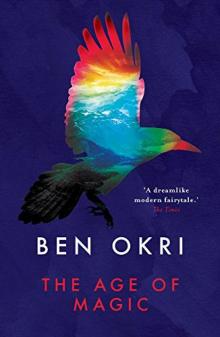 The Age of Magic
The Age of Magic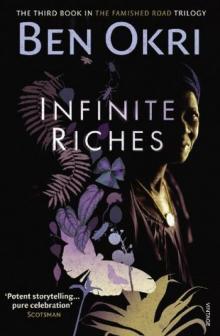 Infinite Riches
Infinite Riches Songs of Enchantment
Songs of Enchantment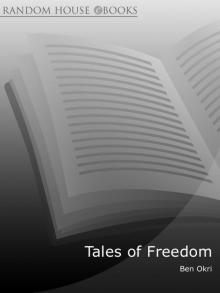 Tales of Freedom
Tales of Freedom Dangerous Love
Dangerous Love Starbook
Starbook The Famished Road
The Famished Road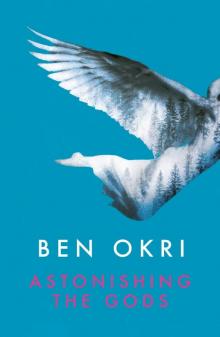 Astonishing the Gods
Astonishing the Gods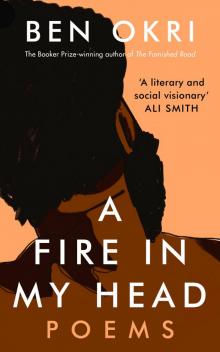 A Fire in My Head
A Fire in My Head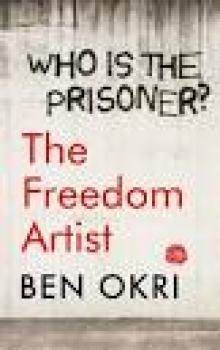 The Freedom Artist
The Freedom Artist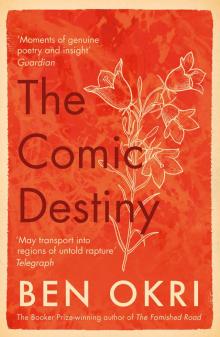 The Comic Destiny
The Comic Destiny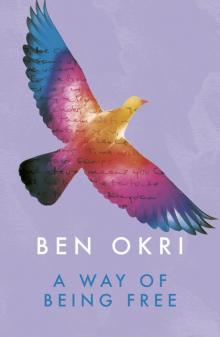 A Way of Being Free
A Way of Being Free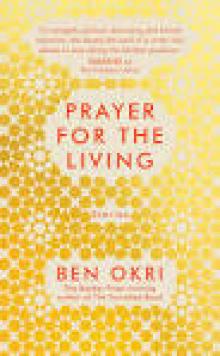 Prayer for the Living
Prayer for the Living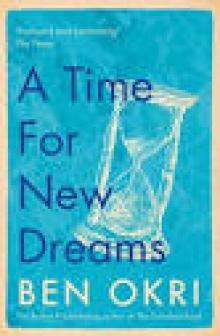 A Time for New Dreams
A Time for New Dreams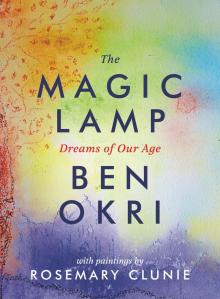 The Magic Lamp
The Magic Lamp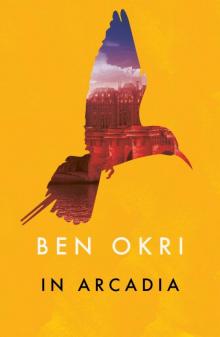 In Arcadia
In Arcadia